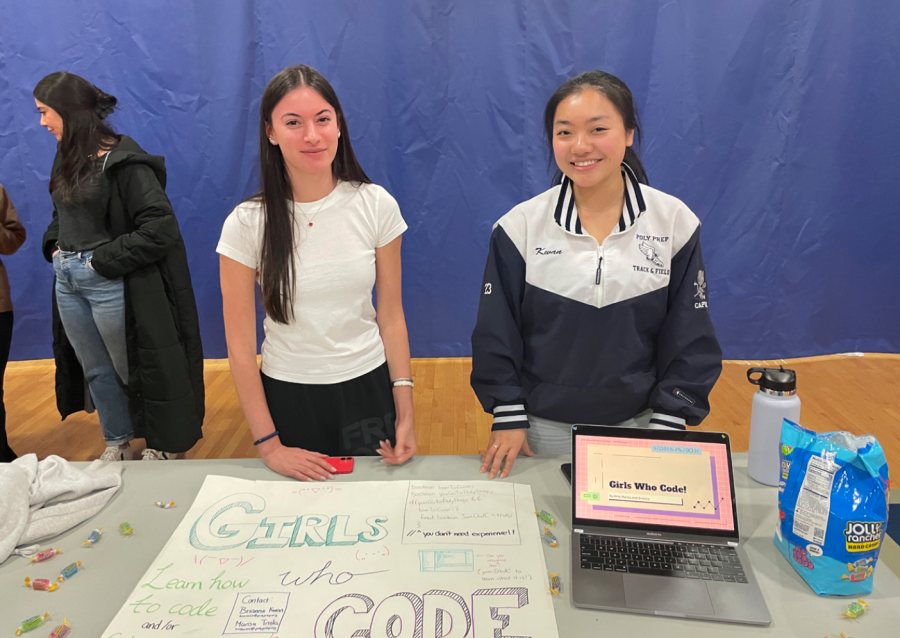Space for Female-Identifying Poly Students to Grow Their Love for STEM
February 17, 2023
STEM (science, technology, engineering, and math) related fields have been historically male-dominated. “Women Are Nearly Half of U.S. Workforce but Only 27% of STEM Workers,” according to Pew Research Center.
At Poly, an introductory technology class that includes coding is needed for all high school students to graduate. Students also have coding opportunities through the Data Science and Game Design classes and the Coding Club. There are also opportunities to code in an exclusively female-identifying environment at Girls Who Code.
Girls Who Code provides a space for women at all levels of coding to come in and learn. Marisa Triola ’24, a student leader of Girls Who Code, said in an email to the Polygon that “We would like to welcome and support club members of all levels! We have had club members who haven’t taken any CS classes and others who are in the highest CS classes. We want to create a space where anyone can participate and learn regardless of their experience.”
Girls Who Code meets in the Maker Space during club blocks and are looking for new project ideas as they learn GIT, a coding language that will allow the members to collaborate on future projects. Annakaecia Clarke ’25, a member of the club, said this project, when decided, “would definitely be something that would benefit Poly or a larger world issue.”
“Girls Who Code is an organization that has been around for close to ten to fifteen years outside of Poly and is committed to bringing girls into computer science. We have been a club at Poly since 2015,” said Jean Belford, the chair of the computer science department and the faculty advisor for Girls Who Code. “Having spaces in STEM that are explicitly for female-identifying students is really important because women are historically misrepresented in STEM. This is really a place for them to build comradery in a non-competitive space, a sisterhood of sorts, and some good networking,” Belford said.
“Being female in the STEM field definitely plays into your experience…You could experience more discrimination simply because of your gender and people might see you as inferior and they might doubt your abilities. I feel like they made Girls Who Code to encourage women to spill into the STEM field despite the things that fight against them,” said Clarke.
There are also other groups that are committed to fostering a space for female-identifying students to come and learn. InFInite Stem, (the capitalized “FI” stands for female-identifying) is a non-profit organization whose mission is featured at Poly by Belford. This group brings female students across the Middle and Upper Schools together to learn about women in STEM-related fields outside of Poly. “What we aim to achieve is exposure to women who are experts in their various fields. For example, last year we took a class trip to a virology lab at Columbia Presbyterian. The person whose lab it was is Doctor Anne Moscona. She does work on viruses and how to prevent a virus from entering a cell. She was wonderful and invited anyone who wanted to from the Upper School to work at her all-woman lab,” said Belford.
While Data Science and Game Design are relatively new courses, there have been many STEM classes that have been required for Poly students since the school’s start, like math and science. While these classes are generally balanced genderwise, some students have noticed a difference in the gender balance of required STEM classes and not required ones. Antonia Smithmyer ’25 is an avid STEM student and is currently taking a class called Object Oriented Programming. “It’s me and two other girls in the class. Even though I enjoy it it can be very discouraging to pursue a path like this because of this gender gap,” Smithmyer said.
However, in Smithmyers’ Advanced Biology class, she has noticed that “in comparison to coding, the gender [of the students in Advanced Biology] is mostly balanced, as it is with chemistry. I think this is because these courses aren’t optional so most women aren’t discouraged. I don’t think it’s viewed as especially strange or unique for a girl to pursue science in society as it is with coding.”
Math Teacher Victoria Stawowy-Mokos stated “there definitely is a difference in the way men and women are treated in STEM fields, but I think that is most prominent in workplaces where men outnumber women. Unfortunately, this can cause women to participate less in their workplaces, missing out on opportunities to have their ideas heard.” While STEM fields are male-dominated, Stawowy-Mokos works as a teacher, which is a female-dominated field. She says that part of the reason that she became a math teacher was because she “was fortunate enough to have a teacher that encouraged me to have a voice in the classroom and one that fostered my learning of math.”
“If there’s someone who’s telling you that you can’t do this, don’t listen to them. You have the ability to use your smarts and your experience to create something that could be beautiful or new — we need more people like that. People need to start seeing that women have the ability to be a part of something great. I’d say if you want to do it then do it and show them that they’re wrong,” Clarke said.


























